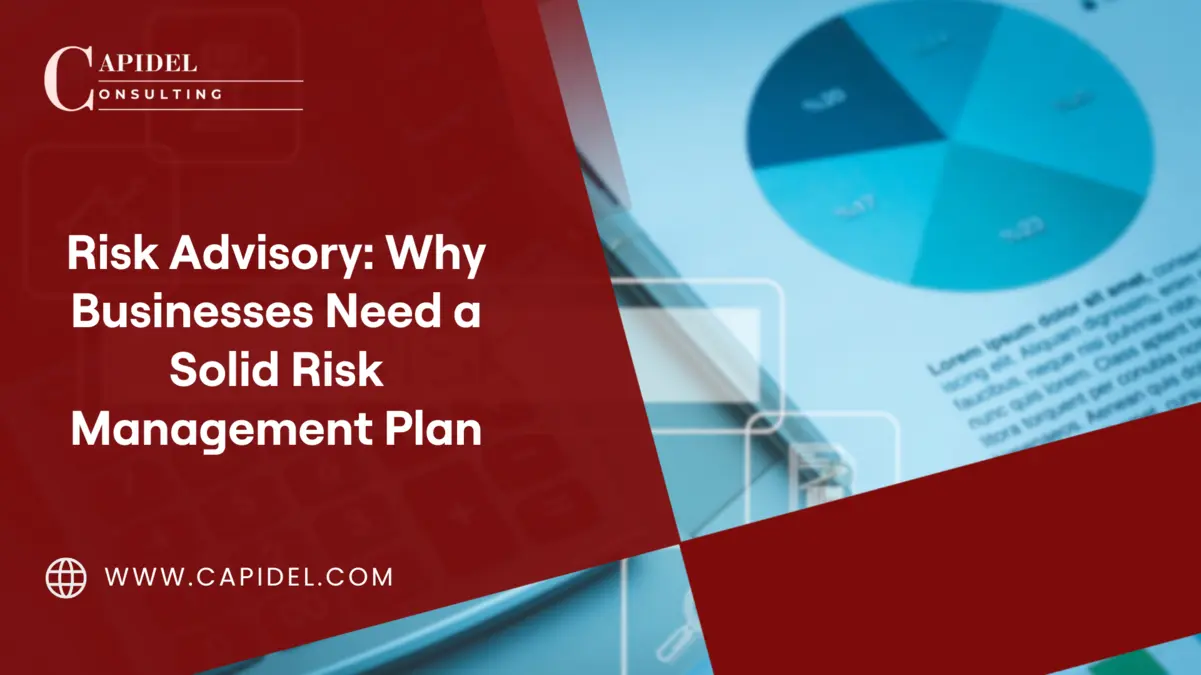
Risk Advisory: Why Businesses Need a Solid Risk Management Plan
Global cybercrime is expected to cost businesses $10.5 trillion annually by 2025, and that’s just one risk in an ever-growing list. From economic volatility to supply chain disruptions, businesses today face a landscape filled with challenges that can severely impact their operations. A solid risk management plan isn’t just a safeguard—it’s a strategic necessity.
Understanding Risk in Modern Canadian Business
In Canada, businesses face a diverse set of risks that, if not addressed, can severely impact their operations. From strict provincial regulations to an increasingly digital economy, these risks are not just hypothetical—they are real and growing. Here’s a breakdown of the key risks Canadian businesses must address to thrive:
- Operational Risk: Canadian businesses often face disruptions in supply chains due to factors like labor strikes or natural disasters. Operational risks can cripple business continuity, making contingency planning essential. Building alternative suppliers and implementing automated processes can help reduce these risks.
- Financial Risk: Currency fluctuations between the Canadian and U.S. dollars, combined with rising interest rates, present significant financial risks. Proper financial management, including hedging strategies and liquidity monitoring, ensures that businesses can navigate this volatility effectively.
- Regulatory Risk: Canada’s regulatory landscape is complex and ever-changing. From privacy laws like PIPEDA (Personal Information Protection and Electronic Documents Act) to strict environmental regulations, non-compliance can lead to substantial penalties. Businesses must stay ahead of these regulatory changes to avoid costly setbacks.
- Cybersecurity Risk: Cyberattacks on Canadian businesses are becoming more frequent. The Canadian Centre for Cyber Security has consistently warned about the increasing threat of ransomware and phishing attacks. A robust cybersecurity plan, including regular audits and threat monitoring, is crucial for protecting sensitive data and maintaining trust with customers.
The Role of Risk Advisory Services
Businesses operating in highly regulated sectors like healthcare, finance, or energy cannot afford to overlook potential risks. From meeting stringent Canadian compliance requirements to managing financial exposures, having expert guidance is critical. Risk advisory services provide businesses with tailored strategies that help them not only meet these challenges head-on but also leverage risks for growth opportunities.
Risk advisory services provide an external, unbiased perspective, allowing businesses to uncover risks that might otherwise go unnoticed. In Canada’s tightly regulated industries—such as finance, healthcare, and energy—these advisors are essential. They help companies comply with stringent laws and regulations while also identifying new opportunities for growth.
Here are some key ways risk advisory services add value:
- Risk Identification and Assessment: Advisors use advanced tools like risk matrices, heat maps, and data-driven simulations to assess risks specific to a business’s sector. For example, financial institutions in Canada rely on stress testing and scenario analysis to quantify exposure to market downturns and interest rate fluctuations. This precision ensures that vulnerabilities are identified and ranked based on their potential impact.
- Risk Mitigation and Control: Once risks are identified, advisors work closely with businesses to develop comprehensive mitigation strategies. This might include enhancing cybersecurity defenses with multi-factor authentication, implementing internal controls, or even diversifying supply chains to minimize operational disruptions. These strategies are not one-size-fits-all; they are tailored to each business’s specific needs.
- Risk Monitoring and Reporting: Risk management doesn’t stop at identification—it requires ongoing vigilance. By integrating real-time dashboards, predictive analytics, and automated reporting systems, risk advisory services offer businesses continuous monitoring. For sectors like real estate or energy, these tools can automatically flag changes in key risk indicators, allowing businesses to react before problems escalate.
The Strategic Imperative of a Comprehensive Risk Management Plan
A comprehensive risk management plan is not just a necessity—it’s a strategic advantage. Here’s why forward-thinking businesses must prioritize it:
- Informed Risk-Taking for Growth
A comprehensive plan allows businesses to identify risks early, assess them accurately, and take calculated risks. Companies can pursue market expansion, product innovation, or new investments with confidence, knowing they’ve accounted for potential downsides. This strategic foresight separates leaders from followers. - Financial Safeguards Against Market Volatility
In Canada, where economic conditions are impacted by fluctuating global markets, currency swings, and interest rate changes, financial stability is crucial. A solid plan involves liquidity management, currency hedging, and scenario planning to shield businesses from unexpected financial shocks and ensure operational continuity. - Ensuring Regulatory Compliance
Canada’s regulatory environment is complex and evolving, from PIPEDA for data privacy to environmental regulations. A risk management plan integrates real-time monitoring and compliance tracking, ensuring businesses stay ahead of new laws and avoid hefty fines, operational delays, or reputational damage. - Operational Resilience in the Face of Disruptions
From natural disasters to supply chain disruptions, operational risks can strike without warning. A well-constructed risk management plan identifies key vulnerabilities and builds resilience through redundancies, such as alternative suppliers or digitized processes, ensuring the business keeps running when others may falter. - Protecting Corporate Reputation
A brand’s reputation can be destroyed in an instant by a data breach, public scandal, or regulatory violation. Proactive risk management includes crisis response plans, reputation monitoring, and stakeholder communication strategies, helping companies navigate crises while preserving trust and loyalty.
Risk Management: A Proactive vs. Reactive Approach
A common misconception is that risk management is primarily a reactive process. In reality, risk management should be proactive, integrated into the business’s overall strategy, and continuously evolving.
Proactive Risk Management:
- Scenario Planning: Risk advisory services employ scenario analysis to project potential risk events and their impact on the business. This type of planning allows companies to prepare for a range of outcomes, ensuring they can swiftly adapt to unforeseen circumstances.
- Early Warning Systems: Risk advisory experts help businesses set up early warning systems, such as key risk indicators (KRIs), that monitor critical risk areas in real-time. These systems offer a predictive approach to risk management, identifying potential issues before they escalate into a full-blown crisis.
Reactive Risk Management:
While some risks are impossible to predict, having a reactive plan in place ensures that businesses can respond effectively when a crisis occurs. These plans often include incident response protocols, business continuity strategies, and recovery procedures that minimize downtime and financial loss.
The Role of Technology in Modern Risk Management
From real-time risk assessments to AI-driven predictive analytics, technology has redefined how businesses approach risk. In industries like finance and healthcare, where data integrity and compliance are non-negotiable, leveraging cutting-edge risk management tools is crucial. Businesses that fail to adopt these technologies risk falling behind in mitigating threats and maintaining operational continuity.
Here’s how technology enhances risk management:
- Risk Management Software
Modern platforms automate risk tracking, providing real-time updates and predictive analytics. These tools simplify the process of assessing risks by streamlining data collection, analysis, and reporting. For example, businesses can use these platforms to forecast potential disruptions based on historical data, allowing them to respond more proactively. - Data Analytics and AI
AI-driven analytics transform the way businesses assess risk. By analyzing vast datasets, AI can detect patterns, identify correlations, and provide insights that would be impossible for human analysts alone. This advanced analysis supports more accurate risk predictions, helping companies stay ahead of issues like market volatility or operational inefficiencies. - Cybersecurity Tools
With cyberattacks on the rise, businesses must integrate advanced cybersecurity technologies into their risk management plans. Real-time threat detection tools, encryption, and AI-powered vulnerability assessments help businesses safeguard their data, ensuring rapid response to breaches and minimizing financial and reputational damage.
Elevating Business Strategy with Expert Risk Advisory Services
Businesses today face an unprecedented level of risk—from volatile financial markets to increasingly complex regulations. What sets successful companies apart is their ability to turn these risks into opportunities. Expert risk advisory services provide the critical insights and tailored strategies needed to not only safeguard operations but also drive strategic growth.
Investing in a comprehensive risk management framework isn’t just about minimizing disruptions—it’s about staying ahead of them. Companies with proactive risk management are better positioned to adapt, innovate, and thrive, even in the most volatile environments. From protecting financial assets to mitigating reputational damage, a robust risk strategy is a core driver of long-term success.
Looking to strengthen your business strategy? Capidel Consulting offers expert risk advisory services tailored to your industry. Get in touch today to build a risk management plan that secures your future growth.
